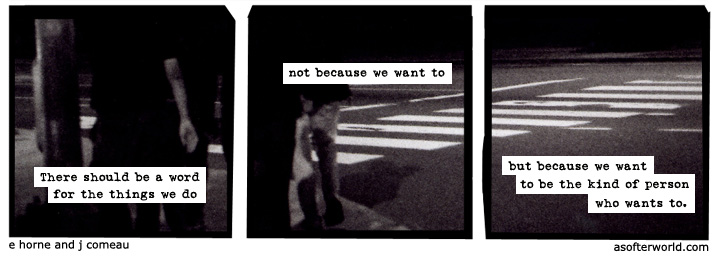“There is no such thing as society. There is living tapestry of men and women and people, and the beauty of that tapestry and the quality of our lives will depend upon how much each of us is prepared to take responsibility for ourselves and each of us prepared to turn round and help, by our own efforts, those who are unfortunate.” –Margaret Thatcher

“Every new beginning comes from some other beginning’s end…” – Semisonic on my graduating to Yale from this dear high school.
It is a fascinating experience to play the unfamiliar role of “student ambassador” to twelfth-graders in one’s former high school. Although some of those students were considering the Ivy League, none had heard of how its “need-based” financial aid policy might offer middle-class kids a better value than a state school. In fact, most were broadly unaware of basic differences between the institutions they sought to attend. It was the oddest thing, returning to a perspective where even the brightest were simultaneously unaware of the range of opportunities before them and largely oblivious to that unawareness.
Later, while wandering the distantly familiar halls, I happened across a fellow ex-cadet from our school’s popular JROTC program. Immaculately poised in his Marine Corps dress blues, Alex sat across from the cafeteria at a table decorated with promotional material. We had a good laugh for old times’ sake. He asked me about the liberals in New England, and I asked him about the Corps and his wife Amanda, who had succeeded me years ago as the notoriously ruthless executive officer of our former battalion. The soft drawl in his voice beckoned a reflexive smile, as did his unaffected style of common-sense, “real world” politics. It all reminded me how far I was from the privileged, insular urbanity of Yale.
It is incredible how things change in four years.
The dynamics Claire Vaye Watkins, now an assistant professor at Bucknell, describes in her poor, rural Nevada high school have several points in common with my majority-minority alma mater in suburban Virginia. In particular, the cozy symbiosis between M.V.H.S. and the military had no parallels among private, elite universities. Local servicemembers—like my parents—sent their children to the school; JROTC facilitated easy access to the Armed Services Vocational Aptitude Battery and warm relationships with recruiters and military alumni. Unsurprisingly, many old classmates are in the military, where many have been married parents since before they could legally drink. (Before you gasp, my yuppie friends, this is normal where I grew up.)
Of course, myriad former classmates did go off to college. My old friends from U.S. Army bases in Germany preferred schools in whatever states they happened to graduate or somewhere they had ties. In Virginia, top-achievers went to the University of Virginia. Other promising students opted for other in-state schools, including Virginia Tech, Old Dominion, and Virginia Commonwealth. A handful departed for service academies. When it occurred to me to ask after their choices, most shrugged away the inquiry; they chased after their best interests within the realm of familiar networks.
Perhaps I am supposed to say, as Watkins suggests, that my community would be better served by more Ivy Plus attention. That may be true, and those elite institutions could certainly benefit from the infusion of more conservative, middle-class perspectives. Yet my friends seem generally to be doing well for themselves, which is more than I can say for me. So instead, I will make two observations about how the world may change—in the universities and in politics.
First: when the Supreme Court rules on marriage, it may also find race-based affirmative action unconstitutional. If so, there will be a panoply of didactic musings about post-racial mythology, insidious social trappings, blinding privilege, Asians, and so on. As a practical matter, institutions will face two options: (1) abandon diversity or (2) be more innovative in fostering it. Assuming most opt for the latter, they will have to get more creative in non-racial outreach to the underprivileged—as in, accounting for financial assets and concentrated poverty, rather than relying on income. But to get the applicants in the first place, elite universities will have to cultivate roots in places where for years the military and local schools have reaped uncontested from an enduring communal presence.
Second: Republicans for too long have been to poorer, browner, and younger Americans as Ivy League schools have been to middle-class public schools like mine: out of sight, out of mind. My being the third student in five years to matriculate from M.V.H.S. to New Haven was not enough to sustain a substantive connection between my alma maters. For that, Yale—or Harvard or MIT—would need to aggressively maintain relationships with faculty, two-way channels with administrators and parents, and a network of joint alumni who would shape the realm of possibilities for those who walk after them.
In the absence of anything resembling even an attempt at real connection with “Democratic” demographics, the GOP resembles little more than a distant collection of prejudices, most of them negative. Noises about broader inclusion are a fine start, but the game is a long one. Republicans will find limited returns in sudden “outreach” to minority neighborhoods a couple months before tough elections. A long-term investment in conversations with churches, college campuses, charitable organizations, and underprivileged career-seekers will bring conservatives into discussions where they were once despised or irrelevant. Never again should a sitting Republican congressman need to refer his unemployed kin to a functional subgroup of the Democratic caucus.
Resetting the conversation surrounding history, politics, and biases will not happen in a cycle. In the short-term, Republicans can expect rabid resistance from the Left against any attempts to expand the coalition of the Right. But poor, blue-collar, multicultural, and middle-class Americans are an abundant resource throughout this country. Any institutions that are to pass the test of time—politically, academically, or otherwise—are obliged to mine and develop that talent.

